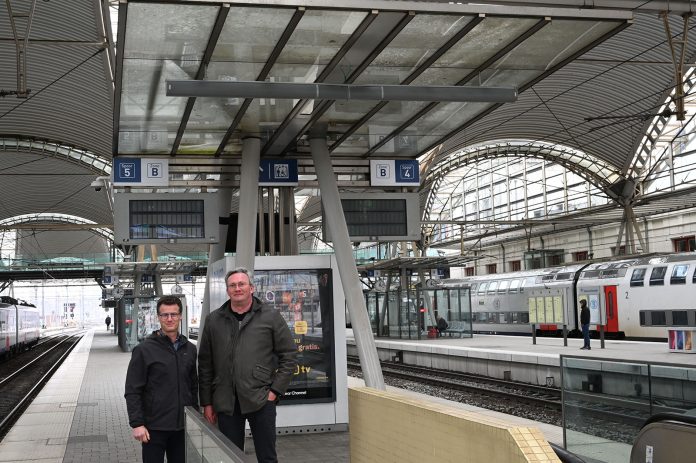Active Audio is celebrating the largest deployment to date of its intelligent, steerable StepArray SA180S column loudspeakers.
64 of the speakers are providing ultimate intelligibility as part of a unique new sound system deployment at Leuven railway station in Flemish Brabant, Belgium.
Originally constructed in the 1830s, the current station design dates back to 1875, when it was rebuilt in the eclectic style.
Since 2000, it has undergone a series of renovations, including the addition of a monumental roof comprising 16 sloping white domes, designed by Philippe Samyn and Partners to resemble sails fluttering in the wind, with 13 railway lines underneath serving national and international destinations.
The complex acoustic environment created by this mix of architectural styles, as well as restrictions on how the loudspeakers could be installed, presented the main challenges for Active Audio and system integrator TVV Sound, according to Arbane Groupe’s Eric Grandmougin.
Grandmougin defined the system’s specifications after modelling the acoustics of the station.
He explained that the design of the SA180S – which provides a 15m SPL of 97dB in a slimline 1,840mm by 124mm package – allowed his team to experiment with installing the loudspeakers horizontally, enabling them to work around the restrictions inherent in the space.
“This new way of using Active Audio column loudspeakers was first tested and validated internally, before being integrated into an electroacoustic model of the station to predict the system’s overall performance,” he commented.
“The results obtained were in line with the operator’s requirements, and validation listening sessions were carried out in Belgium at our distributor, TVV Sound.
This project enabled us to validate the performance of the SA108S in a horizontal position, as well as the homogeneity of the directivity.”
“Most of Leuven station’s platforms are covered by a large, high arched canopy, while some are covered by a low, flat roof,” confirmed Edo Dijkstra, CEO of TVV Sound, which was contracted by Infrabel, the Belgian public railway operator, to overhaul the previous 20 years old PA system.
“The renovation included the replacement of the existing loudspeakers under these canopies, both high and low. Architecturally, nothing was allowed to change the layout of the existing loudspeakers.”
In Leuven, the StepArray columns, in addition to being mounted in a horizontal orientation, were coupled together in pairs (32 by 2 SA180S), helping TVV Sound to work around the space constraints while still being able to adjust the speakers’ directivity.
This was an essential aspect of the final installation, which needed to be capable of delivering clear public announcements, along with ambient background music, to the more than 8 million passengers annually who pass through the station.
“It was only with a beam steering system that we were able to achieve perfect sound reproduction,” explained Dijkstra, referring to the DGRC (Digital & Geometric Radiation Control) steering technology built into the StepArray series, which was key to combatting the acoustic reflections produced by the station’s concrete and glass structure.
DGRC uses a patented arrangement of speakers that reduces the number of amplifiers necessary to drive the loudspeaker system while still ensuring excellent directivity.
“Active Audio’s StepArray loudspeakers are renowned for their optimal intelligibility and acoustic comfort,” he added, “and unique because of their controlled directivity. They are also the only company whose products can guarantee the horizontal beam steering we needed for the Leuven project.”
Eschewing traditional analogue networking, the Leuven installation makes use of the audio-over-IP protocol Dante – a set-up made possible by choice of Powersoft Quattrocanali 1204 DSP+D amplifiers, 32 of which power the 64 StepArray.
DSP+D versions of the Quattrocanali, Powersoft’s flexible solution for small and medium-sized installations, allow full control of the amplifier, as well as system and load monitoring, via a PC running either Dante Controller or Powersoft’s ArmoníaPlus software.
Beyond the performance of its StepArray speakers, the Leuven project demonstrated the ability of Arbane Groupe to respond to the specific demands of a large-scale installation, according to Grandmougin.
“Indeed, the horizontal use of the columns required mechanical adjustments to the loudspeakers in order to allow easy installation of the system,” he added, “taking into account the specifics of railway stations, which are not very simple places in terms of integration.”
Tom De Bie from Infrabel said the company is “very satisfied” with the new sound system, which has been painted to match the station’s existing colour scheme. “The clarity of the audio provided to travellers has improved considerably,” he commented.
Dijkstra was similarly proud of what Active Audio and TVV Sound have achieved in such an acoustically challenging environment.
“A station like Leuven, a unique building with complex acoustics, requires a more complex sound system to achieve the required quality,” he concluded. “As is clear from the result, StepArray, with its versatility and unique DGRC technology, is that sound system.”





